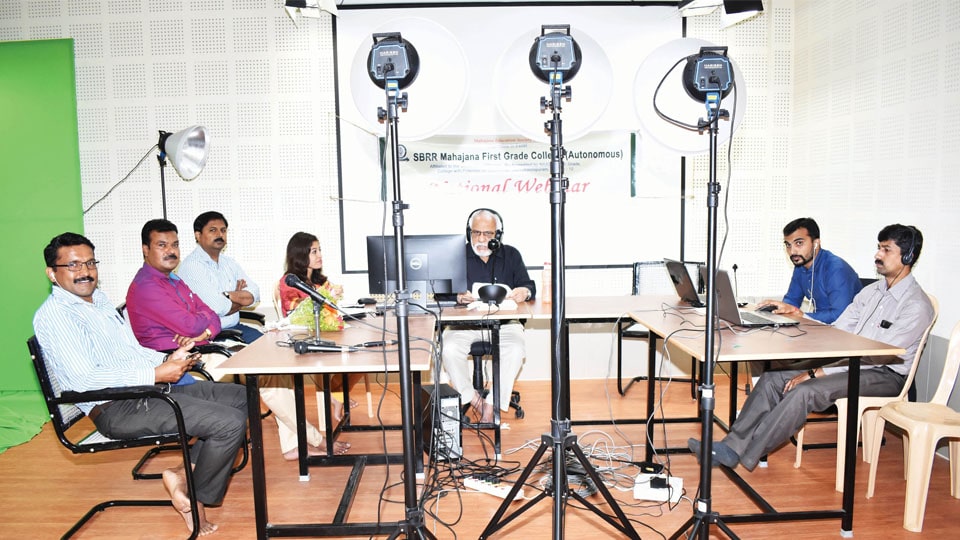Mysore/Mysuru: Departments of History, Geography and IQAC of SBRR Mahajana First Grade College, Jayalakshmipuram, had recently organised a National Webinar on ‘Impact of COVID-19 on Historical and Geographical Tourism in India – A Case Study of Mysore’ by Dr. N.S. Rangaraju, retd. Professor, Department of Ancient History & Archaeology, University of Mysore, Mysuru.
Dr. Rangaraju explained how tourism and migration are different from each other. He focused on the cause and effects of COVID-19 on Tourism Department and quoted “Coronavirus – Dark Age of Tourism in India.”
He briefed out the painful journey of tourism in Karnataka and pointed out how Mysore State has given priority to tourism. He also listed out the heritage structures which are more than 100 years old.
He also pointed out that UNESCO should identify India and Karnataka as a World Heritage Country and City and review about the progress and development of tourism in heritage cities across the country.
Speaker noted the factors of post Historical Tourism with reference to Mauryan and Roman Empire for the purpose of trade and commerce.
Dr. H. Sreedhara, Assistant Professor and Head, Department of History and Convener of the Webinar, welcomed. Dr. G. Doddarasaiah, Webinar Co-Convener and Assistant Professor, Department of Geography, proposed a vote of thanks. Dr. B.R. Jayakumari, Principal, SBRR Mahajana First Grade College, presided over the session.
At the end of the session, interaction with participants was held. There were over 200 participants from across the country.
Environmental-friendly Technology
The Department of Physics, Environmental Science, along with IQAC of SBRR Mahajana First Grade College, had recently organised a National Webinar on ‘Environmental-friendly Technology’ by Shamsundar Subbarao, Head (NIE-CREST) and Associate Professor, Department of Mechanical Engineering-NIE, Mysuru, who is also recognised as Co-ordinator of Mysuru District Bio Fuel I&D Centre, Government of Karnataka.
Shamsundar Subbarao, in his lecture, spoke on reducing Carbon footprints by using bio-mass technology, setting up a bio plant, use of rainwater harvesting techniques, bio-fuel, re-using of waste water for the sustainability of environment. He pointed out how technology helps in implementing these eco-friendly ways. Use of solar energy, micro grids, sustainable building materials are some of the other environmental-friendly technologies people should adopt, he added.
The speaker also briefed about his eco-friendly work in different villages in Mysuru. He has built eco-friendly house for Anganwadi workers with bamboo and mud inclusion along with rainwater harvesting.
He also explained his work in the lab where bio-fuel is generated using cooked oil.
He also demonstrated the implementation of bio compost in the residential places and stressed the use of recycled water for growing vegetables.
Dr. P.G. Pushparani, Principal (in-charge), presided over the session.
M.H. Sunitha, Assistant Professor and Head of the Department of Environmental Science and Convenor of the Webinar, welcomed. S. Poornima, Assistant Professor, Department of Physics, proposed a vote of thanks.
The presentation was followed by an interaction session and various queries raised by the participants made it clear that people are willing to adopt eco-friendly ways and therefore related information should be made available easily and often.
More than 200 participants from across the country were part of the webinar.








Recent Comments